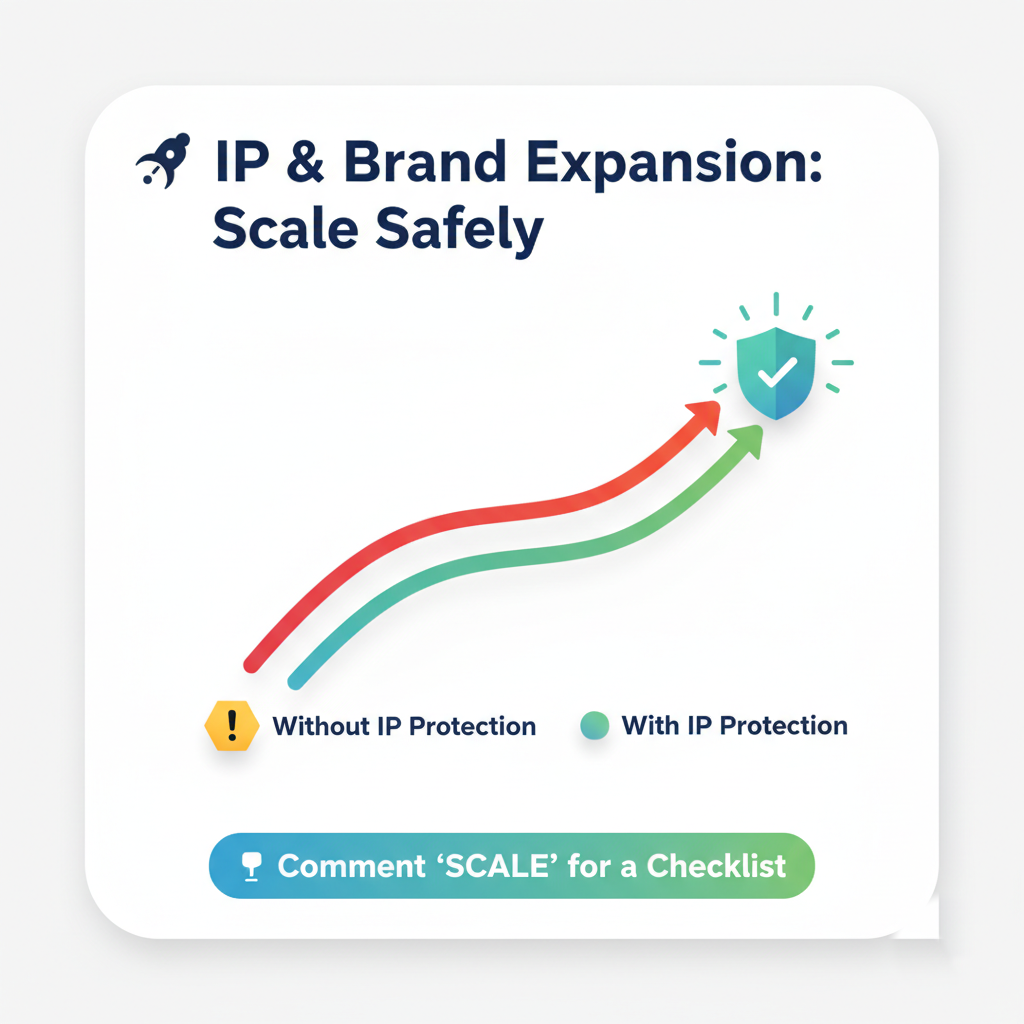Why Scaling Without IP Protection Is Risky
Every entrepreneur dreams of seeing their business grow beyond local boundaries – new markets, new customers, new opportunities. But scaling is not just about increasing revenue or expanding operations; it’s about protecting the foundation of your business: your brand.
Without strong intellectual property (IP) protection, scaling can turn into a nightmare. Competitors may copy your brand, disputes may arise in new markets, and you could even lose the right to use your own business name.
In this guide, we’ll explore how businesses can scale safely by securing their brand first.
Section 1: The Hidden Risks of Scaling Without IP Protection
Scaling too fast without legal safeguards exposes you to:
-
Trademark disputes: Another business might already be using a similar name in your new market.
-
Copycat products: Competitors can duplicate your product design or packaging.
-
Brand dilution: Weak enforcement means your brand loses uniqueness.
-
Costly rebranding: Rebranding after scaling can cost millions in lost trust, marketing, and legal fees.
Real-life example: A small e-commerce brand expanded internationally without trademark protection. Within a year, a competitor registered their brand name locally, forcing them to rebrand and lose years of customer recognition.
Section 2: Intellectual Property as a Growth Asset
IP is not just legal protection – it’s a strategic business asset.
-
Investor confidence: Investors trust companies with protected IP.
-
Customer loyalty: Consumers prefer authentic, original brands.
-
Market entry advantage: Protected IP helps you secure licensing, franchising, and distribution deals.
-
Competitive edge: Strong IP makes it harder for competitors to imitate your success.
Think of IP as the foundation of your expansion strategy. Without it, growth can collapse under pressure.
Section 3: Types of IP Every Scaling Business Needs
1. Trademarks
-
Protects: Brand name, logo, slogan.
-
Why it matters: Prevents others from using confusingly similar names.
-
Expansion tip: File trademarks early in each country you plan to expand.
2. Copyrights
-
Protects: Creative works (content, website, packaging, software, marketing material).
-
Why it matters: Stops competitors from copying brand assets.
3. Patents
-
Protects: Inventions, unique processes, product designs.
-
Why it matters: Creates a monopoly for your innovation and boosts valuation.
4. Trade Secrets
-
Protects: Confidential formulas, client lists, proprietary processes.
-
Why it matters: Keeps competitors from stealing your “secret sauce.”
Section 4: Scaling Locally vs. Globally – Different IP Challenges
Scaling Locally
-
Easier to manage, but still risky without trademarks.
-
Competitors may register your name if you delay filing.
Scaling Internationally
-
Each country has different IP laws.
-
Trademark rights are territorial – protection in one country doesn’t cover another.
-
Consider WIPO (Madrid Protocol) for international trademark filing.
💡 Case Example: Nike aggressively files trademarks worldwide before launching new products. This ensures brand dominance and avoids disputes when entering new markets.
Section 5: Common Mistakes to Avoid When Scaling Your Brand
-
Delaying trademark registration until after growth.
-
Using generic names that can’t be protected.
-
Expanding internationally without IP due diligence.
-
Ignoring online marketplaces – copycats thrive on e-commerce platforms.
-
Not monitoring brand misuse – allowing fakes erodes trust.
Section 6: The Step-by-Step Brand Protection Strategy
Step 1: Conduct an IP Audit
-
Review your trademarks, copyrights, patents, and trade secrets.
-
Identify what’s missing or vulnerable.
Step 2: Register Trademarks Early
-
Secure your brand name and logo in home and target markets.
-
Use professional IP attorneys for global filings.
Step 3: Strengthen Copyrights
-
Protect all content, designs, and creative work.
Step 4: Secure Patents (if applicable)
-
File for patents before public disclosure.
-
Explore licensing and royalty opportunities.
Step 5: Protect Trade Secrets
-
Use NDAs, contracts, and internal policies.
Step 6: Monitor & Enforce
-
Use IP monitoring tools to track misuse.
-
Take legal action against infringers quickly.
Section 7: How IP Fuels Long-Term Growth
-
Franchising: Your trademark is the backbone of franchise agreements.
-
Licensing: Strong IP lets you monetize without physical expansion.
-
Partnerships: Big companies prefer working with legally protected brands.
-
Valuation: A strong IP portfolio increases company valuation for M&A or investment.
Section 8: Scaling Checklist – Protect Before You Expand
✔️ Have you registered your business name and logo as a trademark?
✔️ Do you own copyrights for your content, website, and marketing?
✔️ Are your products patented or patent-pending (if innovative)?
✔️ Do you have NDAs and contracts to protect trade secrets?
✔️ Have you checked IP laws in your target expansion markets?
✔️ Do you have a brand monitoring system in place?
Conclusion: Secure Your Brand, Scale With Confidence
Scaling is exciting, but doing it without protecting your intellectual property is a gamble that can cost you everything you’ve built.
By making IP the foundation of your expansion strategy, you ensure your brand grows safely, sustainably, and profitably.
👉 Want a practical guide to protect your brand before scaling?
Download our Brand Scaling Checklist and expand with confidence.



